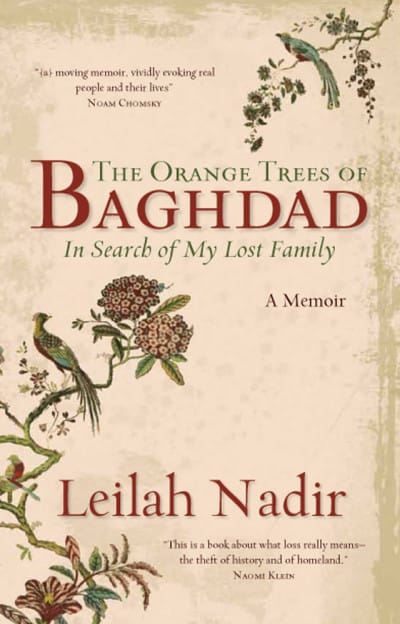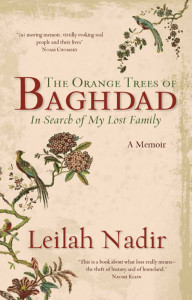"The Orange Trees of Baghdad"

By Beth Jellicoe
Where do I start? “Orange Trees” is simply exquisite: a tale that understands the complexities of families, the way war and imperialism rip through not only nations but individual hearts, lives and relationships. Raised in Britain and Canada as a third culture child (with an Iraqi father and an English mother) Leilah Nadir’s curiosity about Iraq began early in life, with visits from her magical Iraqi relatives. She had still not visited Iraq when war broke out in 2003, by which time she was an adult, but she retained childhood memories of her Iraqi relatives and a deep desire to visit them. Sadly, she never had the chance.
Nadir plunges us almost straight into operation Shock and Awe, March 22, 2003: seeing the bombing through her eyes, the reader can feel her fear intensely. Nadir had relatives in Baghdad, and six of them died during the occupation.
The war devastated her. “I realised that my mother’s culture was terrorising my father’s,” Nadir writes. “It’s as one part of me is invading the other. I feel like this war is between two cultures whose blood flows in me.” Nadir’s story grows outwards from there as she explores her father’s memories of her family history, records her relatives’ experiences of living through the war, and eventually travels to the Middle East herself – staying out of Baghdad, but exploring family roots and connections in Syria and Lebanon. Nadir takes joy in the smallest details of Middle Eastern life, but the visit is marred by horrifying reports of the war damage in Babylon and the inhumanity of the American forces.
The prose is wonderful: often poetic yet always lucid, sometimes it borders on the mythical: “One day it is necessary to depart with nothing rather than stay with everything, because everything you have is worthless,” Nadir writes, describing Iraqi refugees. But when looking at the war, Iraq’s historical background, and tragic stories from the Middle East, Nadir switches skilfully to deadly accurate, insightful observation. This balance of the poetic and journalistic is present throughout the book. This is a personal story of loss and deep love and near the end, Nadir describes her agony at hearing about the death of one of her relatives in Baghdad: “Rage that somehow the war has won, the war has kept us all from being with her for the last years of her life … Everything about our connection to Iraq was vanishing.” But in a bittersweet turn of events, it turned out all was not lost. Without giving away too much, in Nadir’s words “Iraq came to me.”
The war in Iraq has been well documented, but often Westerners forget that the country is more than a “conflict zone”, and lives are more than numbers. In my opinion, every Western apologist for the war, including Tony Blair himself, should be made to buy a copy of “The Orange Trees of Baghdad” and read it, cover to cover.
“The Orange Trees of Baghdad” is published in the UK on March 13 (Simply Read Books).




